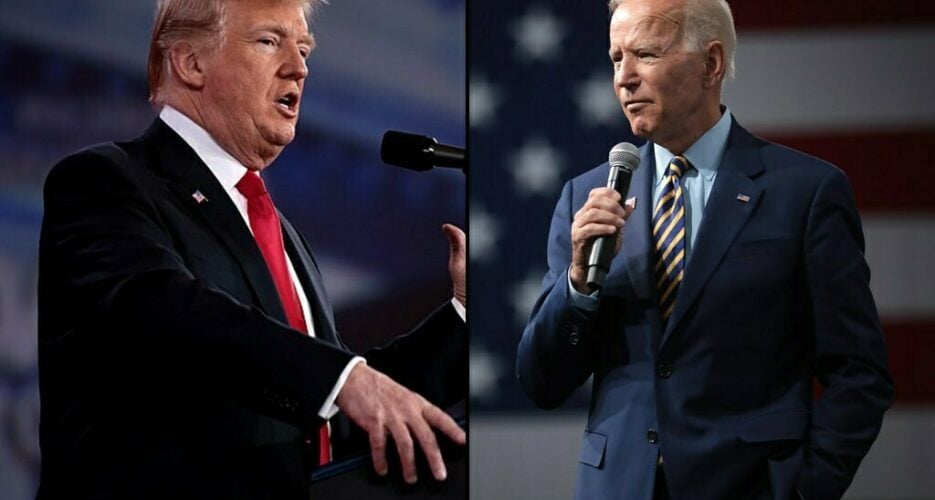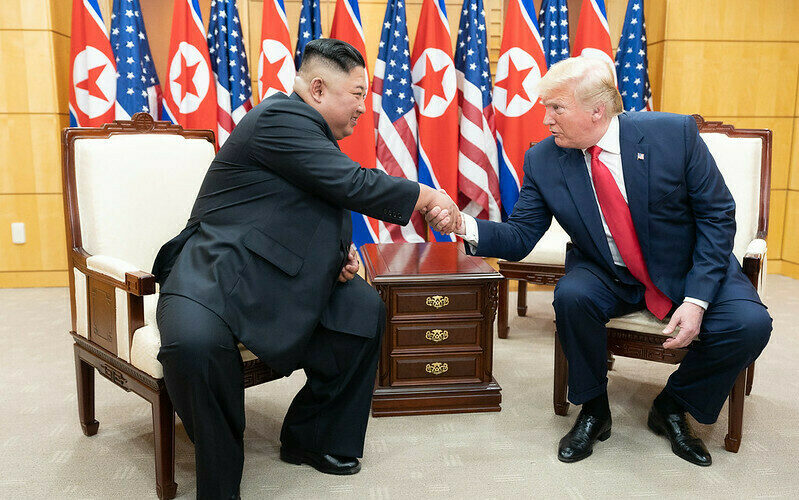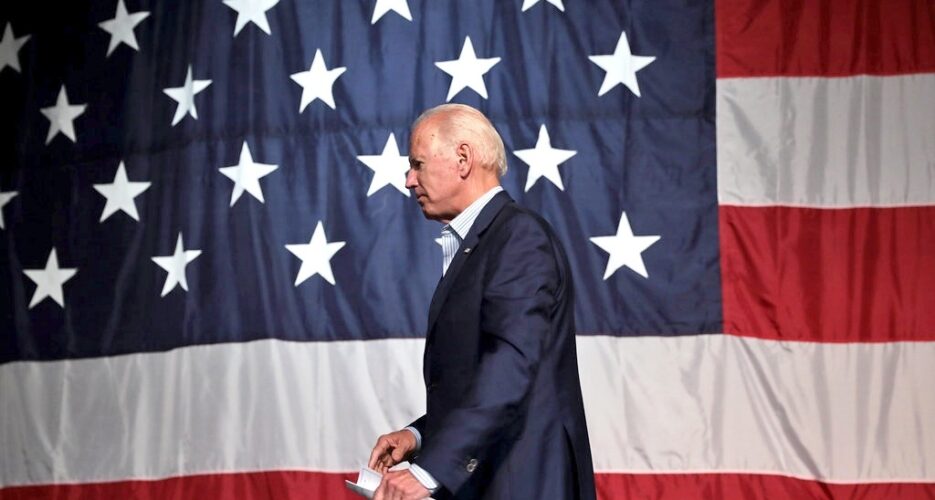Joseph R. Biden Jr. was elected the 46th president of the United States on Saturday, returning the White House to Democratic Party rule after four years of Trump and likely resurrecting a more traditional U.S. approach to North Korea.
Biden’s election marks a serious departure from Trump’s intimate but improvised relationship with North Korean leader Kim Jong Un, and rides a wave of domestic backlash against the U.S. president for his COVID-19 performance and controversial stance on several hot-button social issues.
Shortly before noon on Nov. 7, several news organizations announced that former Vice President Biden won the election with a narrow lead in several battleground states, surpassing the 270 required electoral college votes and garnering about 50.5% of the popular vote, according to The New York Times.
U.S. President Donald Trump has repeatedly vowed to legally challenge the election results and also made several false, preemptive claims that he won the vote. If the results go uncontested, Biden and his running mate, California Senator Kamala Devi Harris, are expected to take the White House after being inaugurated on Jan. 20, 2021.
So far, experts say that the two Democrats will bring a more calculated approach to foreign relations with them.
“On North Korea and so many issues, Biden and Harris will bring a coherence and a competency that has been lacking for four years,” said John Delury, a professor at Yonsei University’s Graduate School of International Studies. “They will take the North Korea issue really seriously, in a more disciplined and organized way. It doesn’t mean they’ll come to the right conclusion, but the process will be back to a more normal U.S. government process.”

TRUMP’S LEGACY
Donald Trump was painfully unpopular among American liberals and much of the world, ranking as the most politically-polarizing president in U.S. history.
But for all of his perceived faults, Trump’s approach to North Korea read as refreshingly unconventional to some analysts — especially in contrast to the Obama era of “strategic patience.”
“Any deal with North Korea is likely to be very unpopular with a lot of people,” said Peter Ward, a researcher on North Korean politics and the economy and a contributing analyst to NK Pro. “But I think, to be honest, Trump was one of the only people who seemed to be able to strike a deal.”
Past U.S. presidential administrations generally pursued “working-level talks” between high-ranking American and North Korean officials before considering a meeting between the two countries’ top leaders. But Trump largely bypassed those steps and went straight for face-to-face summits with Kim Jong Un — a controversial move that still receives both criticism and praise.

“One of the things we lose is the chemistry between Chairman Kim and Trump. I know a lot of people don’t like it, but it does have some benefits,” Harry J. Kazianis, director of Korean Studies at the Center for National Interest, told NK News. “Let’s face it: When you look at the history of U.S.-North Korea relations, it always seems to fall apart when we have these working-level talks.”
“It’s a shame that more was not agreed upon [at the summits], but meeting with North Korea and trying to improve relations is not a bad idea,” Ward added. “It has also set a precedent, and now it will be easier for any new president to do it. That’s good.”
But even though Trump and Kim met three times and made history by crossing the military demarcation line together, the U.S. president’s legacy as a U.S.-DPRK dealmaker started to crumble when he abruptly walked out of the Hanoi summit in Feb. 2019.
Since then, Trump and Kim have only exchanged a few stray letters, with North Korea publicly declaring summits “useless” and later rolling out a provocative new intercontinental ballistic missile (ICBM) on Oct. 10.
“One has to give Trump credit where credit is due — in the breakthrough of 2018 and the summits,” Delury added. “But at this point, it has been a while now since Trump has shown what he can do, and he just lost interest. It became an issue that he talked about in the past tense.”

A NEW ERA?
Experts say that a Biden White House will likely put an end to issues straining Washington’s alliance with Seoul, such as military cost-sharing and Trump’s chronic threats to withdraw U.S. troops from the Korean Peninsula.
But Biden may also “take on a tougher approach when it comes to North Korea,” Kazianis said, and that could ramp up tensions.
“If you want a much more robust sanctions regime and someone who is going to put more pressure on China to enforce sanctions … Then you want Biden,” he said. “But if you look at this from Seoul’s perspective, [Biden] won’t make an issue about cost-sharing and SMA agreements — the things that get in the way of Seoul and Washington focusing on North Korea.”
Just days before top news organizations declared Biden the winner on Nov. 7, he published a rare op-ed that vowed to “keep pressing toward a denuclearized North Korea.”
In the essay, Biden also accused Trump of “extorting Seoul” by repeatedly threatening to withdraw U.S. troops from the Korean Peninsula — a message that underscores his agenda to repair U.S. alliances and a possible return to more conventional North Korea policy.
But none of this means that Biden would oppose sitting down with Kim Jong Un, according to experts. During the final Oct. 22 presidential debate, Biden said that he would consider meeting the North Korean leader “on the condition that he would agree that he would be drawing down his nuclear capacity.”

“If you look carefully at his language, he left himself plenty of room to meet with Kim Jong Un. You could drive a truck through all the room he left himself,” Delury said. “I think he’s not sure yet.”
“I would hope the Biden team takes an open mind and looks at the pros and cons of the Trump approach and the Obama period in a detached way,” Delury added. “I hope that they recognize that they are entering new territory.”
Biden’s win likely closes the chapter of “fire and fury” and “rocketman” rhetoric, but it’s unclear where U.S.-DPRK relations are headed next — and whether North Korea will respond in kind, or with some sort of provocation of its own.
“We will have to see what happens … Biden and Harris will have to catch up,” said Cheehyung Harrison Kim, a professor at the University of Hawaii at Manoa. “They’ll have to talk to the experts and really change the entire framework on how the U.S. government is dealing with North Korea.”
“The most dire, urgent issue is communicating with the House and working together with Congress on issues like North Korea,” Kim added. “So far, that’s something that Trump hasn’t been able to do.”
Edited by James Fretwell
"traditional" - Google News
November 08, 2020 at 12:12AM
https://ift.tt/3eIU2zG
Biden wins election, foreshadowing a more traditional US approach to North Korea - NK News
"traditional" - Google News
https://ift.tt/36u1SIt
Shoes Man Tutorial
Pos News Update
Meme Update
Korean Entertainment News
Japan News Update
Bagikan Berita Ini














0 Response to "Biden wins election, foreshadowing a more traditional US approach to North Korea - NK News"
Post a Comment